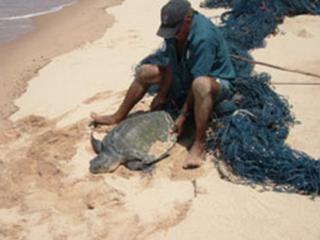
The Tiwi Islands comprise Melville Island and Bathurst Island (Australia's 2nd and 5th largest islands), and numerous smaller islands. The Tiwi Islands are listed as a site of conservation significance for both their land and sea biodiversity values.
They have a combined coastline of around 800 kilometres, much of which is inaccessible by road. The coastal areas of the Tiwi Islands support internationally significant nesting sites for marine turtles, seabirds and major aggregations of shorebirds.
Based at Milikapiti and Pirlangimpi, the Tiwi Islands Marine Rangers' activities include:
- coastal surveillance patrols
- marine debris surveys
- monitoring of olive ridley turtle nesting activity and crested tern rookeries
- visitor site management
- increasing community awareness about marine debris.
The rangers also provide input on coastal and marine management issues with various stakeholders. Their work complements the land-based activities of the Tiwi Land Rangers, particularly on managing quarantine issues.
The Tiwi Land Rangers carry out a range of land management and liaison activities including:
- environmental contract work
- biological surveys
- providing support for ecological research
- heritage and sacred site assessments
- rehabilitation of developed areas
- fire management for carbon abatement
- weed management and pest monitoring
- quarantine surveillance and biosecurity.
A range of partnership projects have been undertaken with other land management organisations and commercial operators on the Tiwi Islands. These are aimed at increasing knowledge of listed threatened species. This information is then incorporated into land use planning on the islands.
The Tiwi Land Rangers play a key role in community engagement. They regularly interact with the broader community and act as role models for young Tiwi people by:
- visiting schools
- giving presentations
- taking students on country for work experience.
State: NT - Top End region
Administration Organisation
Tiwi Resources